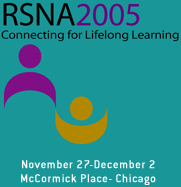
Abstract Archives of the RSNA, 2005
Arthur Jesus Iglesias MD, Presenter: Nothing to Disclose
May Abdel-Wahab MD, Abstract Co-Author: Nothing to Disclose
Richardo Guirola MD, Abstract Co-Author: Nothing to Disclose
Purpose/Objective: To evaluate the outcome and management of patients with small cell carcinoma of bladder treated at our institution. Materials/Methods: Patients with small cell carcinoma of the bladder seen at the University of Miami/ Jackson memorial hospital between 1993 to 2004 were included in this study. Demographic factors including age,gender,race were studied. Tumor -related factors such as stage, site of tumor within the bladder and pathology, as well as treatment-related factors such as type of surgery, doses of radiation therapy and chemotherapy were reviewed.SPSS statistical program was used to calculate median survival and frequencies. AJCC classification was used for staging. Results: Ten patients with small cell carcinoma were available for review. Of these 10 patients, 5 (50%) presented with stage II, 1 presented with stage III, 2 presented with stage IV and stage was unknown in the remaining two patients. The most common presenting symptom in these patients was gross hematuria. All 10 patients were male, and four patients had a history of smoking. Of the two patients who presented with stage IV disease, one had peritoneal involvement, and the other had pulmonary metastasis at time of presentation. With regard to management, 5 of the 10 patients underwent radical cystectomy with neobladder- only one of these 5 patients received additional adjuvant chemotherapy. Of those did not undergo radical surgery, one received chemotherapy and radiation therapy( XRT) and another received XRT alone without chemotherapy due to a pre-existing cardiac condition which led to early demise. In the remaining three cases, One had chemotherapy alone to control widespread disease and the other two had rapidly progressive disease, surviving 3 and 3.5 months respectively and were unable to receive treatment. The median survival of the entire group was 17.5 months (range 3-70 months).The patient who received chemotherapy and XRT had a median survival of 26 months with good bladder function and tumor control. The median survival of the patients with stage 2-3 disease who underwent radical cystectomy was 57 months (range of 13-70). Conclusions: Definitive treatment in the form of radical cystectomy or radiation therapy & chemotherapy may be an effective treatment in early stage small cell carcinoma of the bladder. Chemoradiotherapy, in particular may allow bladder preservation in these patients.
Iglesias, A,
Abdel-Wahab, M,
Guirola, R,
Small Cell Carcinoma of the Urinary Bladder: An Institutional Experience. Radiological Society of North America 2005 Scientific Assembly and Annual Meeting, November 27 - December 2, 2005 ,Chicago IL.
http://archive.rsna.org/2005/4420673.html

